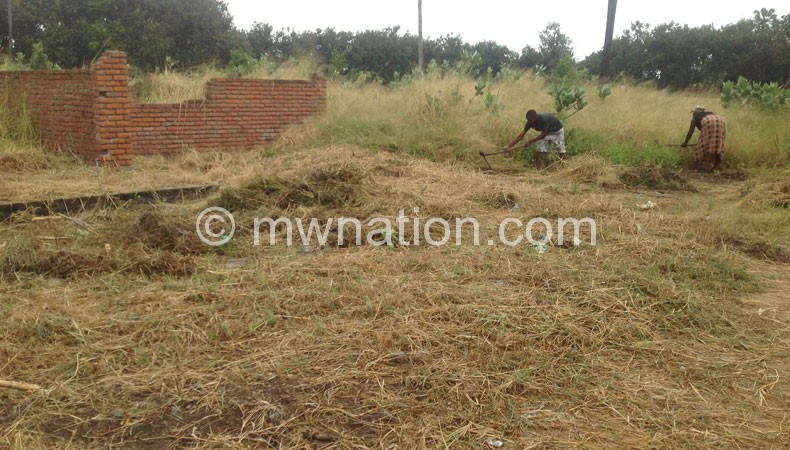Lack of land ownership for women makes them vulnerable
Christina Chisunkha, a widow from Chitipa, is outraged that women in the district do not have equal access to and control of land as men, although the Constitution gives all citizens the right to obtain property and engage in economic activity.
Twenty years after Malawi adopted the democratic Constitution, women continue to face challenges in land access and control. Being a critical component of the agricultural sector, women are being denied adequate contribution to food security in the process.

Chisunkha of Mkombanyama Village, Traditional Authority Mwaulambya in Chitipa, blames the situation on the patrilineal cultural practice in the district.
Under the patrilineal system which is prevalent in the Northern Region, land is transferred from fathers to sons. If a woman moves to her husband’s village at the time of marriage, she often loses rights to her family’s land. Similarly, in the event of divorce or the death of her husband, she also loses the land.
Chisunkha is one of the victims of land rights. A few months after her husband’s death, her in-laws sold their land without her knowledge. Such stories are common in Chitipa and other districts in the country.
“I only learnt that the land had been sold when the buyer came to evict us,” explains Chisunkha.
She has been unable to regain the land although the matter was reported to traditional leaders in the area, the custodians of cultures.
The piece of land the two owned was a source of livelihood for the family, where they grew maize, bananas, beans, groundnuts and leafy vegetables. Today Chisunkha is destitute and has turned to prostitution to provide for her children.
Women’s access to land and property is central to economic empowerment as land can serve as a base for food production and income generation. The development means that women such as Chisunkha in Chitipa will remain disadvantaged despite that over 70 percent of agriculture labour in the country is done by women. This is not good for Malawi’s food security and nutrition.
Nutrition Convenor at the Institute of Development Studies (IDS), University of Sussex in the United Kingdom Katherine Pittore observed that although Malawi has institutional, legal and market frameworks for accessing land, they do not always help poor and rural households gain secure land tenure.
Speaking at a Nutrition Working Group meeting organised by the Civil Society Agriculture Network (Cisanet) in conjunction with IDS, University of Sussex, Pittore pointed out that the Constitution of Malawi provides for a non-justifiable right to food and the right to social security, but that some of the rights exist on paper and are not effectively enforced.
“Discrimination against women reduces their access to, and ownership of farmland, thereby increasing their vulnerability to hunger and under-nutrition,” she said, adding: “Women’s economic rights to property and agricultural land could be strengthened to reduce their vulnerability to hunger.”
The challenges that women face in patrilineal societies are further compounded by the impact of climate change, such as droughts, floods, increased incidence of pest and disease, shrinkage of the rainy season, reduced productivity in crops and livestock, and increased incidences of disease such as malaria.
These incidences have increased over the years in spatial distribution, intensity, frequency, magnitude, duration, and suddenness (unpredictability) and they have taken a toll on women.
Therefore, without land, women cannot grow food or earn and control assets, and their ability to provide a complete and healthy diet for their children is severely undermined by the impact of climate change.
Over the past few years, Malawi has experienced recurrent food crises affecting as many as 21 of 28 districts in the country and around 20 percent of the population have suffered from chronic hunger.
In the 2013/14 farming season, extended periods of dryness, poor rainfall distribution, and an early cessation of rainfall affected localised production in parts of the middle Shire and central Karonga livelihood zone. Experts blamed the situation on climate change.
Currently, poor households in Karonga, Balaka, Neno and Mwanza districts are likely to face food challenges around the lean period of August to December, according to the Famine Early Warning System (Fewsnet).
During such lean times, families rely on women as pillars of household food security and nutrition. But in many places in the country, where malnutrition rates are critically high, women are increasingly vulnerable because they lack access to land for farming.
Cisanet national director Tamani Nkhono-Mvula has observed that women are affected by climate change more due to their roles of reproduction and production when they are also expected to take an active role in community development.
Poverty also makes households to be risk averse, leading in most cases to production of low value food stuff, he said.
Gender and nutrition
In Malawi, production (70 percent of subsistence farmers) and preparation of food is generally done by women, said Nkhono-Mvula.
“This means that any disturbance on smallholder productivity by climate change (including discrimination of women to access and control land) will have a direct effect on the nutrition status of most rural households,” he added.
“From the scenario presented above, there is a direct linkage between climate change and nutrition and is mainly on how climate change is affecting women. Therefore, any policy intervention on climate change and nutrition should address the gender factor for it to be more effective.”
He explained that the project done by Cisanet and IDS tried to bring out this conceptual linkage and how effective policies on climate change, food security and nutrition can be effectively designed.
“The National Nutrition Policy and the National Food Security Policy are somehow lacking in addressing this conceptual linkage. We need to ask ourselves how we can make these two policies more gender and climate sensitive,” he said.
If nothing is done to improve women’s access to farm land, they will remain vulnerable to hunger and under-nutrition which has plagued Malawi for many years. n





